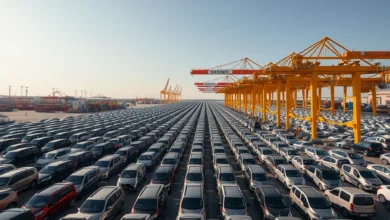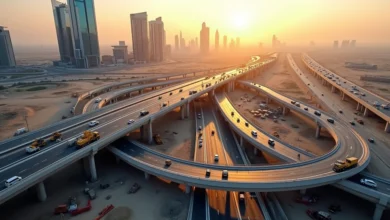
GCC Grand Tours Visa: A New Era of Travel in the Middle East
The Gulf Cooperation Council (GCC) has unveiled the “GCC Grand Tours” visa, marking a significant stride toward enhancing tourism and travel convenience across its member countries, including Saudi Arabia, Qatar, Oman, Bahrain, Kuwait, and the United Arab Emirates. Heralded as a key to economic growth and a boost for the region’s tourism sector, this initiative aims to streamline tourist travel and attract a record number of international visitors, fostering a new era of travel in the Middle East.
Set to launch by the end of 2024, the GCC Grand Tours visa will offer travelers a seamless experience similar to the Schengen visa, allowing a stay of over 30 days through vital e-services. This unified visa system is not only expected to simplify visa requirements but also significantly contribute to the economic development of the GCC region by increasing tourism numbers and driving business travel.
Overview of GCC Countries
The Gulf Cooperation Council (GCC) is a regional political and economic union comprising six Middle Eastern nations: Saudi Arabia, Kuwait, the United Arab Emirates, Qatar, Bahrain, and Oman. Established in Riyadh in May 1981, the GCC aims to foster unity among its members through shared political and cultural identities rooted in Arab and Islamic traditions.
Decision-Making Structure
- Supreme Council: This is the highest authority in the GCC, consisting of the heads of state of each member country. Decisions require unanimous approval.
- Ministerial Council: Comprising foreign ministers or equivalent officials, this council meets quarterly to implement Supreme Council decisions and propose new policies.
- Secretariat-General: The administrative branch responsible for monitoring policy implementation and organizing meetings.
Economic and Security Coordination
- Security Initiatives: The creation of the Peninsula Shield Force in 1984 and an intelligence-sharing pact signed in 2004 highlight the GCC’s focus on regional security.
- Economic Policies: Efforts towards economic unity include a customs union implemented in 2015 and a value-added tax introduced in 2018.
Economic Indicators
- GDP and Population: As of 2023, the GCC boasts a combined GDP (PPP) of $3.655 trillion and a population of approximately 59.62 million.
- Oil Production: The GCC states are among the world’s leading oil producers, with vast reserves driving their economies.
Cultural and Economic Ties
- EU Relations: The GCC is a significant market for EU exports, including agricultural products like barley, dairy, and cereals.
- Tourism: In 2022, the UAE and Saudi Arabia were top destinations for Indian tourists, illustrating the region’s appeal in the global travel market.
Monetary Initiatives
- Khaleeji Project: Plans for a common currency, the Khaleeji, faced setbacks with the UAE and Oman withdrawing from the monetary union project.
This overview of the GCC countries highlights their strategic economic and security collaborations, significant global economic contributions, and cultural conservatism, setting a context for understanding their collective impact on regional and global stages.
Key Features of the ‘GCC Grand Tours’ Visa
Unified Visa Concept
The “GCC Grand Tours” visa introduces a unified system, akin to the Schengen visa, allowing travelers to visit all six GCC countries—Saudi Arabia, Qatar, Oman, Bahrain, Kuwait, and the UAE—with a single visa. This system simplifies the travel process, making it more accessible and efficient for tourists.
Duration and Flexibility
Travelers can stay for over 30 days with the possibility of extending their visa for an additional 30 days. This flexibility supports longer visits and deeper exploration of the region, enhancing the travel experience.
Cost and Extensions
The initial cost of the GCC Grand Tours visa is set at $100, with an extension available for an additional $50. This pricing strategy aims to be affordable, encouraging more tourists to consider extensive travel within the GCC region.
Multi-Entry Functionality
As a multi-entry visa, it allows tourists to move freely among the GCC countries during the validity period. This feature is particularly beneficial for expatriates residing in the GCC, as well as international tourists wanting to explore multiple destinations within a single trip.
Economic and Touristic Impact
By streamlining the visa application process and reducing travel restrictions, the GCC Grand Tours visa is expected to attract a higher number of international tourists, subsequently boosting the regional economy, and enhancing the tourism sector.
Final Stages of Approval
Currently, the visa system is in its final stages of discussion, with GCC countries considering important security and technical aspects to ensure a successful implementation.
Impact on Tourism and Economy
The introduction of the GCC Grand Tours visa is poised to revolutionize the tourism landscape in the Gulf Cooperation Council countries. This unified visa system is expected to streamline travel across Saudi Arabia, Qatar, Oman, Bahrain, Kuwait, and the UAE, significantly boosting the region’s appeal as a top travel destination.
Economic Growth Through Tourism
The GCC Grand Tours visa initiative is projected to attract a record number of international tourists, with estimates suggesting up to 128.7 million visitors by 2030. This surge in tourism is anticipated to drive substantial economic growth, with increased spending on accommodations, dining, and leisure activities.
Infrastructure Development
To accommodate the expected influx of tourists, substantial investments are being made in tourism infrastructure. This includes the expansion of airports, the development of new cruise terminals, and the construction of the GCC Railway, which will enhance connectivity across the region.
Job Creation and Economic Stimulus
The growth in tourism and infrastructure development is expected to create numerous job opportunities in the hospitality and travel sectors. This economic stimulus extends beyond tourism, impacting local businesses and services that cater to an increased number of visitors.
Cultural Exchange and Regional Cooperation
The GCC Grand Tours visa also facilitates cultural exchange and strengthens regional cooperation. By making it easier for tourists to explore multiple GCC countries on a single trip, the visa encourages a deeper understanding and appreciation of the diverse cultures within the Gulf.
Long-term Visitor Engagement
With the possibility of extending the GCC Grand Tours visa, tourists are encouraged to prolong their stays, leading to higher hotel occupancy rates and increased spending. This sustained engagement is crucial for establishing the GCC as a leading destination for both regional and international tourists.
Through the pioneering initiative of the GCC Grand Tours visa, the Gulf Cooperation Council countries are embarking on a transformative journey aimed at revolutionizing travel and tourism within the region. By enabling tourists to traverse the beautiful landscapes, rich cultures, and diverse heritage of Saudi Arabia, Qatar, Oman, Bahrain, Kuwait, and the United Arab Emirates with a single visa, this policy not only simplifies the travel process but also promises significant economic, cultural, and social benefits. The foresight to boost economic growth through tourism, coupled with the anticipated increase in international visitors, underscores the strategic importance of this visa in positioning the GCC as a premier global travel destination.
Moreover, the introduction of the GCC Grand Tours visa is set to foster greater regional cooperation and cultural exchange, enhancing the GCC’s appeal on the international stage. The initiative’s potential to spur infrastructure development, create jobs, and stimulate economic activity across various sectors highlights its significance far beyond the tourism industry. As the GCC countries prepare for the visa’s implementation, the anticipation of its positive impact on the regional economy and the global perception of the Gulf as a unified, accessible, and inviting destination is undeniable. This move paves the way for a new era of travel in the Middle East, reinforcing the region’s standing as a hub of economic dynamism and cultural richness.







[…] Bahrain’s rich cultural heritage comes alive through vibrant displays of traditional arts, cuisine, and fashion during National Day celebrations. The kingdom’s people proudly showcase their cultural identity while they embrace modern festivities. […]